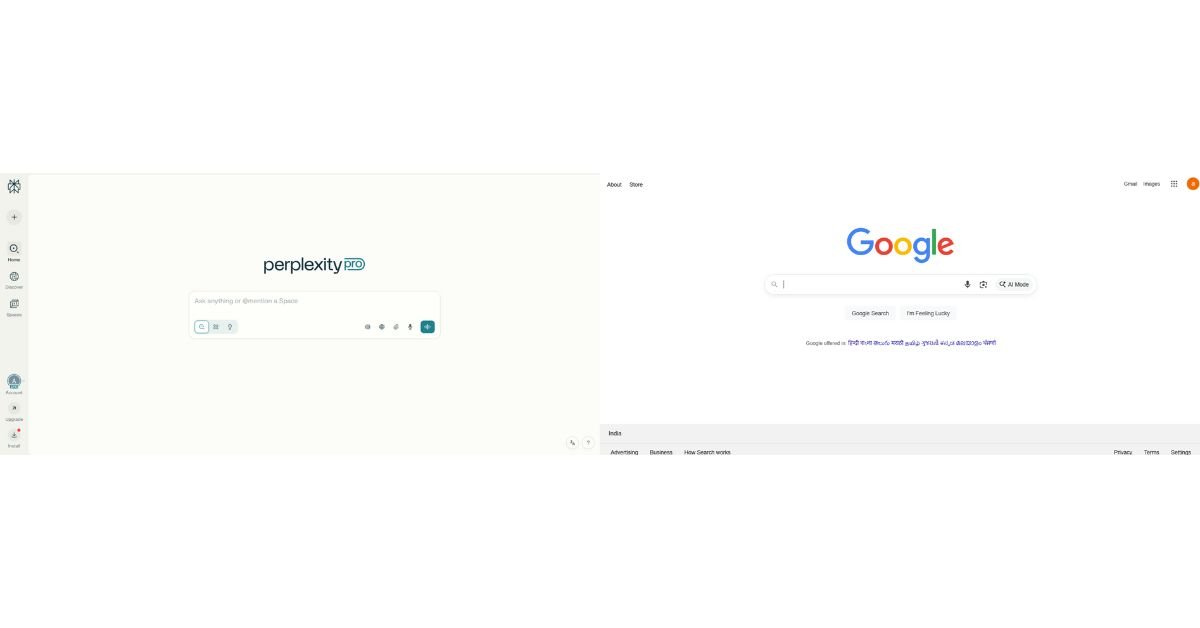It’s more crucial than ever to be able to get reliable information online. Search is no longer only about putting in terms and looking at links because of the rise of generative AI. Now, though, we want quick, well-organized replies. The AI Search Engine 2025 issue is very important for this reason.
People talk about two big companies a lot these days: Perplexity and Google. Both offer research findings that are quicker and wiser. But their methods are very different. So, which one should you choose when you need to be clear and accurate?
We’ll compare Perplexity with Google in this blog based on five distinct criteria: accuracy, speed, user experience, depth of results, and real-world uses. You’ll know which AI Search Engine 2025 is ideal for you at the end.
Why These Two Are Important in 2025
Google is still the best search engine in the world. It has added AI capabilities like Search Generative Experience (SGE) during the past few years, which have made search more conversational and based on context.
Perplexity is new, yet it has swiftly become popular. It calls itself an “AI-native” search engine that was built from the ground up to answer inquiries in natural language.
Google’s SGE, which is powered by AI, is robust, but it doesn’t always make sources as evident. The summary that is made is sometimes correct, although it doesn’t include clear citations. It works well for simple questions. But for school or employment, they might need to check again.
You can read more about how Google describes its AI-powered search in the official Google Search blog
Both are examples of the two paths the AI Search Engine 2025 competition may take: one improving on years of success, and the other completely rethinking search.
How to Compare
To be fair, let’s compare Perplexity to Google in five important areas:
- How accurate the information is
- Speed and Effectiveness
- Interface and User Experience
- How deep and clear the results are
- Use Cases in Real Life
These are the most important things that customers want from an AI search engine in 2025: trust, speed, clarity, and usefulness in the actual world.
Correctness of Information
Perplexity: Perplexity was made for study. It gives direct answers and lists the sources at the bottom. This is extremely helpful for students, professionals, and researchers. You don’t have to ask yourself, “Where did this come from?” The AI Search Engine 2025 edition of Perplexity even scans several sources before giving you an answer.
Google: Google’s SGE, which is powered by AI, is good, but it doesn’t always make sources plain. The summary that is made is sometimes correct, but the citations are not clear. It works nicely for informal questions. However, people may need to double-check for school or job purposes.
Verdict: In the AI Search Engine 2025 environment, Perplexity is ahead when it comes to research-grade accuracy.
Quickness and effectiveness
Perplexity: Answers come up rapidly, but the speed might reduce when getting information from more than one source. Still, its short summaries save time compared to reading extensive pages.
Google: Google is still quite quick. Its infrastructure can handle billions of requests per day. This sheer speed is still important in the AI Search Engine 2025 age, especially for rapid searches.
Conclusion: Google is the best for quick answers, but Perplexity is more efficient since it gives you more context.
User Experience and Interface

The screenshot above demonstrates how both search engines offer results. Perplexity gives you clear, citation-backed answers with few distractions. Google, on the other hand, puts AI summaries next to adverts and regular links. This visual difference helps explain why Perplexity feels more research-focused, whereas Google’s design is more general and ad-driven.
Perplexity: The design is simple and easy to read. You ask a query and get a clear answer with a citation. No adverts that are too many or too much stuff. This layout makes it seem like an “answer desk.”
Google: The way Google looks is still the same. It mixes AI summaries with regular search links. But advertising is still at the top of the page. Some people find this annoying when they utilize Google as an AI search engine in 2025.
Verdict: Perplexity is the best way to do research without becoming distracted.
How deep and clear the results are
Perplexity: Always provides sources, so you can read more if you want to. This openness is helpful in fields where verification is very important. For instance, a medical or construction chemicals researcher can look at the publications that are mentioned directly.
Google: Google combines AI replies with links, but it’s not as clear. A lot of the time, you have to go over the findings to make sure. That makes significant research take longer in the AI Search Engine 2025 environment.
Verdict: Perplexity is still the best choice for clarity and transparency.
Practical Use Cases:
This is when things become interesting. Let’s look at who gets the most out of each AI search engine in 2025.
| Use Case | Perplexity | |
| Academic Research | Clear answers + citations for easy verification | Strong, but sources harder to trace |
| Quick Fact-Checking | Good, but slower for simple facts | Extremely fast for quick lookups |
| Professional Reports | Structured, citation-ready responses | Requires extra verification of AI summaries |
| Casual Everyday Use | Simple, but overkill for quick weather checks | Perfect for daily needs like maps, sports, news |
| Deep Learning & Exploration | Encourages diving into cited materials | Broad reach, but less transparent |
Examples in use
Scenario 1: A Student Composing a Thesis
The student gets structured responses with citations from publications when they use Perplexity. It saves hours of research by hand. Google can still assist, but you need to check more often.
Scenario 2: A Professional in Business
Are you getting ready to write a report? Perplexity gives you clean, ready-to-use material. Perplexity cuts down on noise, but Google may cover more ground.
Scenario 3: A User Who Isn’t Serious
Do you want to know what the weather will be like tomorrow or what the score was in last night’s game? No one can beat Google. For such brief questions, perplexity seems like too much.
These examples indicate that the best AI search engine for 2025 will depend on your situation.
At a Glance: Strengths and Weaknesses

This figure shows how Perplexity puts more emphasis on transparency, citations, and study depth, whereas Google puts more emphasis on speed, scalability, and everyday usage. Both have their merits, but comparing the differences side by side makes it easier for readers to choose which AI search engine will help them reach their goals in 2025.
Want to explore more about Google’s latest AI innovations? Check out our deep dive on Top 5 Google AI Launches This Year: Features, Use Cases, and Expert Insights
Strengths of Perplexity:
- Citations that are clear
- A clean UI with no ads
- Made for research and deep learning
- References help build trust.
Weaknesses of perplexity:
- Slower for fast, daily questions
- Not as well-known as Google
Strengths of Google:
- Results that are lightning quick
- A huge ecosystem including maps, news, commerce, and movies
- A familiar interface that billions of people trust
Things that Google isn’t good at:
- Ads and junk in the results
- AI summaries don’t always make it obvious where they came from.
My suggestion: Which AI search engine will be the best in 2025?
Perplexity is the preferable choice in 2025 if you are a researcher, student, or professional. It provides you findings that you can trust and cite, with less noise.
Google is still the greatest choice for casual users who want things to be quick and easy. Its reach and environment are still the best.
To sum it up:
- For depth of research → Confusion
- For everyday use, Google
Personal Insight
I see significant benefit in both since I spend hours evaluating AI technologies. When I write technical blogs or analyze academic literature, I tend to use Perplexity. It saves me time on research and makes readers trust me more.
I still have Google open for quick answers, directions, and regular use. The best plan? Put them both next to each other. In this manner, you may make use of the best features of each AI Search Engine 2025.
Ending
It’s not about one search engine taking over another in the future. It’s more about picking the proper tool for the right job.
Researchers and professionals who demand accuracy and citations will love Perplexity.
For quick answers to daily questions, Google is still the best place to go.
You can make better decisions in the changing world of AI search engines in 2025 if you know how they are different.
Disclaimer: Images are for illustrative and educational purposes only. They are created to support the blog content on AI Search Engine 2025 and do not represent official screenshots from Google or Perplexity.
Last updated on August 30, 2025

Hi, I’m Amarender Akupathni — founder of Amrtech Insights and a tech enthusiast passionate about AI and innovation. With 10+ years in science and R&D, I simplify complex technologies to help others stay ahead in the digital era.



